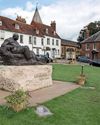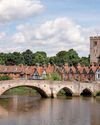
From the old English word ‘wald’, meaning forest, the term Weald was used to describe the ancient wilderness of grassland, scrubland, and forests that stretched across the southeast of England from the Kent marshes to the New Forest in Hampshire.
The Kentish part of this landscape was known as the Forest of Anderida to the Romans during their occupation. The Domesday Book of 1086 showed the Weald to be the largest remaining area of woodland and heath in the whole of England at the time.
For generations, the Weald of Kent was comprised of a scattering of small settlements, with cattle and pigs grazing loose in the woods. But by 1200 much of the Weald as we know it had already formed, with most of the villages, towns, and farmland we would recognise today.
It was during the Middle Ages that the Weald became one of the wealthiest areas in the country, thanks to the trees in it its forests and the iron ore in its ground.
During the Tudor and early-Stuart eras, the Weald was the main iron-producing region in Britain. Local iron ore had been used since the Iron Age but by the mid1500s there were more than 100 furnaces and forges, employing huge numbers of the local population. The furnaces were kept blazing with wood from the surrounding forests, changing the very landscape.
The craftsmen’s work was highly sought after and many made their fortunes. Larger homes were built, including the iconic ‘Wealden hall’ design, many of which survive today. It was only the Industrial Revolution that led to the industry fading, with the last major furnace closing in 1813.
BEST BITS
Quintessentially Kentish countryside and farmland, scattered with pretty villages and country towns, this Area of Outstanding Natural Beauty is popular with walkers, cyclists and nature lovers.
Diese Geschichte stammt aus der November 2019-Ausgabe von Kent Life.
Starten Sie Ihre 7-tägige kostenlose Testversion von Magzter GOLD, um auf Tausende kuratierte Premium-Storys sowie über 8.000 Zeitschriften und Zeitungen zuzugreifen.
Bereits Abonnent ? Anmelden
Diese Geschichte stammt aus der November 2019-Ausgabe von Kent Life.
Starten Sie Ihre 7-tägige kostenlose Testversion von Magzter GOLD, um auf Tausende kuratierte Premium-Storys sowie über 8.000 Zeitschriften und Zeitungen zuzugreifen.
Bereits Abonnent? Anmelden

The choice of leaders
It’s a small, scenic Kentish market town on the border with Surrey, famous for not one but two great leaders. We take a look around Westerham

The eco-warriors
Awarded a Queen’s Anniversary Prize in 2019 in recognition of its research in global nature conservation, the role of Kent-based DICE has never been more relevant

Kent's most CURIOUS MONUMENTS
Our county can boast some of the most celebrated and downright unusual protected mouments in the country

Ghosts of a river's life
Kent Life discovers an an other-worldliness about the marshes, creeks, and saltings of the lower reaches of the river Medway

The return of the son
The Unknown Warrior’s journey from the World War One battlefields via Dover to his resting place in Westminster Abbey is 100 years old this month

We will remember
In a year when we got an inkling of what living through a war means, we remember the 75th anniversary of the end of the Great War

Age-old advice
Just become a grandparent for the first time? Perhaps you need a little guidance, so here are some top tips about how to embrace your new family role

10 GOOD REASONS TO VISIT Medway Towns
A vast Dockyard, a Napoleonic fort and a JCB diggers theme park - let’s visit Chatham and Medway

KENT'S CREEPIEST- GHOST STORIES
Here are 10 tales to make you shiver as we celebrate All Hallows’ Eve

Joking apart
From his home in Broadstairs, Royston Robertson comes up with satirical, topical and sometimes just plain silly cartoons